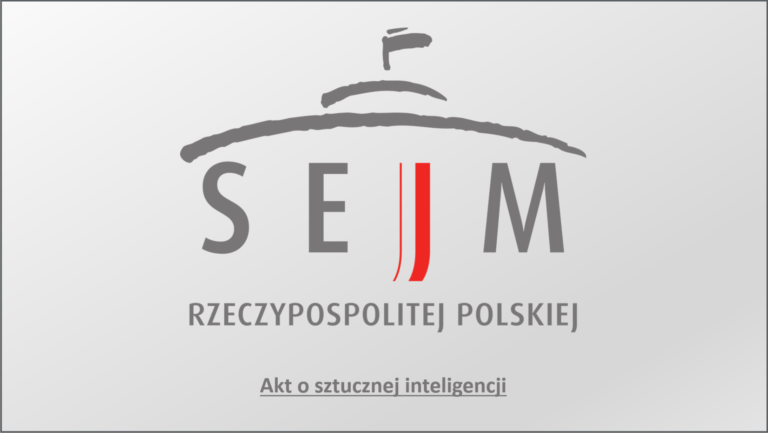Blog
Meeting of the Subcommittee on Artificial Intelligence and Algorithm Transparency
On April 9, 2024, a meeting of the subcommittee on artificial intelligence and transparency of algorithms was held in the Sejm of the Republic of Poland. The meeting concerned the regulations contained in the AI Act – an act on artificial intelligence adopted by the European Parliament on March 13, 2024. It is expected that the Act will be published at the end of May or in June this year, i.e. after the end of the entire legislative process at the European Union level. Then the implementation process will begin. The purpose of this provision is not to regulate the technology itself, but to regulate its applications.
The meeting was attended by MPs – members of the subcommittee and members of the committee on digitization and innovation of modern technologies. The meeting was attended in particular by:
- Secretary of State in the Ministry of Digitization – Dariusz Standerski,
- President of the Personal Data Protection Office – Mirosław Wróblewski,
- representatives of the Office of Competition and Consumer Protection:
- Director of the Department for the Protection of Collective Consumer Interests – Łukasz Wroński,
- Deputy Director of the Department of Competition Protection – Marta Kruszka,
- representatives of the Office of Electronic Communications,
- representatives of industry organizations (Polish IT Society, Polish Chamber of Information Technology and Telecommunications, Polish Chamber of Electronic Communications, Chamber of Electronic Economy, Association of Internet Industry Employers IAB Polska),
- representatives of Trade Unions (Trade Union Forum and NSZZ Solidarność,
- representatives of the scientific community.
The representative of the Ministry of Digitization – Mr. Dariusz Standerski began the subcommittee’s deliberations by pointing out that the discussion regarding the implementation of the Artificial Intelligence Act is crucial not only due to the provisions adopted by the European Parliament in March, but especially due to the design of regulations, systems and frameworks. legal regulations that we will be obliged to comply with in the coming decades. The AI Act is the first in a series of acts concerning breakthrough technologies, i.e. artificial intelligence, but there will certainly be further regulations in this area. That is why it is so important to take thoughtful, responsible actions, taking into account public consultations. The aim is to create a strong institutional basis for adopting further regulations at EU and national level regarding breakthrough technologies.
The act prohibits the use of specific practices and under it AI systems using the following mechanisms will have to disappear first (if they are used within the European Union). Prohibited practices include:
- based on social assessment (social scoring),
- monitoring emotions and well-being, e.g. in the workplace or at university (applies to emotions or intentions such as joy, sadness, anger, surprise, disgust, embarrassment, excitement, shame, contempt, satisfaction and amusement; does not apply to physical states such as pain or fatigue – including, for example, systems used to detect the level of fatigue of professional pilots or drivers in order to prevent accidents),
- using subliminal techniques in a context that discriminates based on age, gender or disability,
- creating biometric databases used, for example, for facial recognition by scrabbing data from video monitoring.
The regulation divides systems into general-use systems and high-risk systems. High-risk schemes introduced by the regulation include, among others: EU products that are regulated directly at Community level, e.g. medical devices, cosmetics, vehicles, children’s toys. This category also includes systems that profile people or assess access to benefits, e.g. granting credit, loans or other financial services. They have specific restrictions indicated in the regulation, including: regarding risk management, maintaining technical documentation, human supervision over algorithms and cooperation with relevant authorities.
The regulation also indicates the need to establish a national authority responsible for market surveillance, which will be responsible for receiving reports regarding violations of the provisions of this regulation. A similar solution already exists in Spain, where an Artificial Intelligence Supervision Agency has been established, and appropriate work is underway in Ireland, Luxembourg and the Netherlands (these offices will probably be later adapted to the requirements of the ultimately adopted regulation). Pre-consultations have already begun at the national level regarding the selection of the office responsible for implementing the future act on artificial intelligence. The Ministry is waiting for comments in this regard. At this stage, no proposals or boundary conditions have been identified. So far, preliminary consultations have been carried out within the Artificial Intelligence Working Group and the results of these preliminary consultations are already available. After completing the pre-consultations, the Ministry wants to start legislative work from October 2024. An information and educational campaign will also be launched regarding the use of this legal act.
The President of the Personal Data Protection Office, Mr. Mirosław Wróblewski, emphasized that the challenge related to the implementation of the Artificial Intelligence Act is the issue of personal data protection, in particular their processing. In art. 2 section 7 of the Act there is a provision on respecting the law on the protection of personal data. Ensuring the actual enforcement of this provision is largely a challenge for the national legislator and supervisory authorities. The act itself also concerns threats related to the non-transparency of algorithms, the possibility of bias or discrimination effects, and the risk of harm caused by artificial intelligence. At the same time, benefits are pointed out – innovations that will have an impact on strengthening the economy. Moreover, there is a need to practically and effectively ensure compliance with the principles of personal data protection contained in the GDPR, e.g. the principles of data minimization, meanwhile artificial intelligence algorithms achieve their perfection by processing large amounts of data. The Office for Personal Data Protection is already carrying out preparatory activities in this regard.
During the subcommittee’s deliberations, the following issues were raised in the discussion part:
- financing of the body that will deal with artificial intelligence in Poland – the cost estimate will be prepared only after the consultations are completed;
- the impact of the AI Act on the competitiveness of the European economy – what is the EU strategy; regulations in the field of artificial intelligence are also being implemented in other countries outside the EU, but at the moment there are no development blockages;
- The AI Act is a precise indication of prohibited and high-risk models that also fit into other EU legislation, primarily GDPR, and in this respect the Artificial Intelligence Act does not exclude the development of artificial intelligence within the EU, especially in the field of AI financing, which is why it is being discussed on the Artificial Intelligence Fund at national and EU level.
Source:
www.sejm.gov.pl


